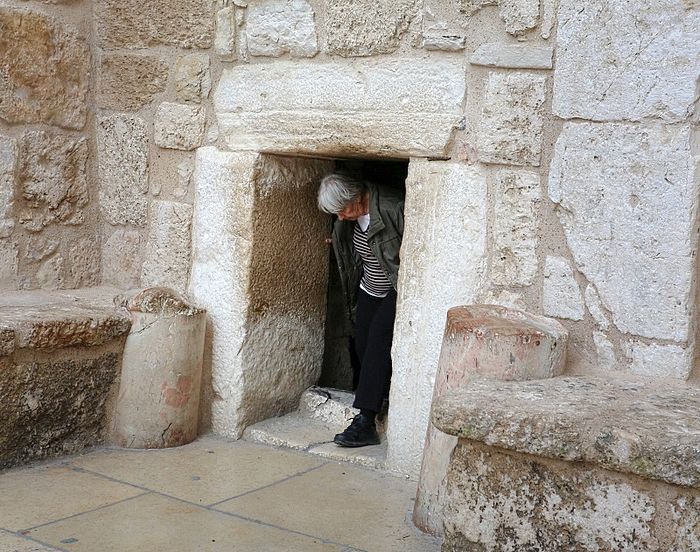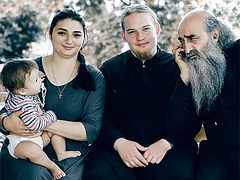 The “Door of Humility”—the main entrance to the Church of the Nativity of Christ in Bethlehem
The “Door of Humility”—the main entrance to the Church of the Nativity of Christ in Bethlehem
The Christian teaching on humility very often becomes a stumbling block not only for outsiders to the Church but also for those who try to integrate into church life. For all that, it is impossible to understand anything in Christianity and indeed in our life without humility.
Architecture lessons
I really like the image that the “Door of Humility” in Bethlehem offer us. It leads to the Church of the Nativity of Christ, and you cannot enter through it without bowing your head. The reason behind its appearance is quite practical: The church clergy had to partly block the entrance to keep Arabs from driving their horses into the church as was their custom. But as a result this makes a lot of sense and is very symbolic: there is no “riding into the Church on horseback” as a “winner”; rather, you can enter it “after dismounting the horse”—that is, with a humble and contrite heart.
We often see how people try to enter the Church however they like, “banging their heads against a brick wall” over and over again. Each blow like this upsets them, and they eventually either become embittered or arrive at the conclusion that life in the Church is so hard it is simply beyond them. But in reality even difficult things in church life can be quite easy to comprehend provided your approach is based on humility. Then why do so many people refuse to humble themselves and reject humility as something that will allegedly crush their souls and deprive them of their human dignity?
In my view, there is only one main reason behind this: people misinterpret humility. People hear the word “humble” and imagine “worthless”, they hear “to become humble” and imagine “to become a nonentity and lose yourself”. At the same time, they forget that humility is a virtue and as a virtue it makes us fuller, deeper and richer; and, most importantly, Christian humility paradoxically has to do with human greatness—something that we had when the Lord created us.
We remember from the Book of Genesis that the creation of man differed from that of all other living creatures: only human beings are made in the image and likeness of God, unlike all other creatures, including even the angels. It was man whom God ordained to be the king of the entire visible world: the Lord brought all the creatures to Adam to see what he would name them. What does it mean? By giving names to all the animals Adam was supposed to comprehend their essence. Originally man had this ability. But as a result of the fall he lost this ability and became a fallen man.
But even after the fall, humans didn’t lose the image and likeness of God—they didn’t disappear. Each of us retains all that the Creator put into human nature when He created us. Each of us is an icon which has got an extensive damage, but nevertheless it remains an icon. Or each of us can be compared with a beautiful building that has been damaged by winds, rains, snow, time, but nevertheless retains its wonderful harmony of forms that was embodied by architects in stone. Each of us is like the Parthenon in which the greatness of the Author’s plan is ineradicable. People’s aspiration for glory and fame is a sign of this grandeur, but this glory is often misunderstood by the fallen man.
To change the coordinate system
Thus our humility is not the belief that we are nonentities, but the conviction of how great we are, coupled with our deep sorrow for the state we live in, having walked away from God. Otherwise it is absolutely unclear why we can “acquire” humility and “grow” in it instead of going with the stream while reproaching ourselves. When Christ said that whosoever of you will be the chiefest, shall be servant of all (Mk. 10:44), He showed us a new coordinate system and not just new ways of behaving. But many people who come to the Church continue to live in the old coordinate system and try to interpret the words of Christ by the old criteria. It seems to them that previously they strove to hold a distinguished position in life, but now they have to give everything up and stamp out all that is good and worthy in them. But this interpretation is absolutely wrong.
There are excellent words that belong to St. Nektary of Optina: it is not until you become absolutely humble that the Lord begins to make something great of you. And we can add that by mercy of God the things which were hindered by our misconceptions about ourselves begin to reveal themselves naturally. As many Holy Fathers said, when someone gets a false idea of his own importance he loses all of his good qualities, but as soon as he no longer has too high an opinion of himself his best traits are revealed with unprecedented power. Why so? Because all that is great and beautiful in us comes from God, while self-conceit overshadows God and pushes Him into the background as we forget Him as the Giver of all things.
All of us know the episode from the Gospel when Apostle Peter was walking on the water but suddenly started to sink. According to a number of commentators, it happened because at some point he thought that he was walking on his own and not by the power of God. Likewise, when we think that the abilities and traits we possess are from ourselves, St. Peter’s story happens to us too.
Undoubtedly, even if we gain riches and achieve a high social status, there are periods when we feel our imperfection and defectiveness. And it is good if through this we will see how fragile and weak we are and how fragile our life intrinsically is. For people it is much easier to come to believe in God when they realize that there are a bunch of things in the world that they are unable to overcome, that their “comfortable” stereotypes and preconceived notions will be “smashed to smithereens” by some life situations, that they will probably experience sorrows that are hard to endure so they may give up without the help of God. And even if people don’t want to accept this, something will cause them to return to this thought over and over again.
Moving upwards, to humility
The wonderful Athonite ascetic, Schema-Hieromonk Ephraim of Katounakia, had the following testimony of his prayer: He said that sometimes while praying he felt as if he were a prince sitting on the throne next to his father. I know that many people after reading these words of Elder Ephraim were tempted and said: How is it that after praying he feels like a prince on a throne and not like the worst sinner? But the ascetic wrote about knowledge of his sinfulness too, so there is no contradiction here. The comparison that he made indicates that at some point, when people pray and sense God’s presence in their lives, suddenly begin to see their original calling. And we must necessarily keep this feeling in our hearts so that it can help us in search of guidance in our lives.
In order to learn humility properly we need to keep in mind the following words from the Gospel: For unto whomsoever much is given, of him shall be much required (Lk. 12:48).
It is important to live our lives with the awareness of how much has been given to us and, therefore, of how much we are responsible for every sin and every step leading to the loss of this gift. Then we will no longer be able to substitute humility with despondency or think that inertia and lack of will are proper Christian behavior and freedom from pride. We often assert that our path in the spiritual life is climbing the “ladder” that leads to heaven. But the same spiritual path is the descent to the depths of humility, which requires enormous inner work as well. We descend to the same depths into which the penitent publican descended, saying: God be merciful to me a sinner (Lk. 18:13). And it is in these depths that the Lord finds us and raises us to the heights which we would never attain by ourselves.




